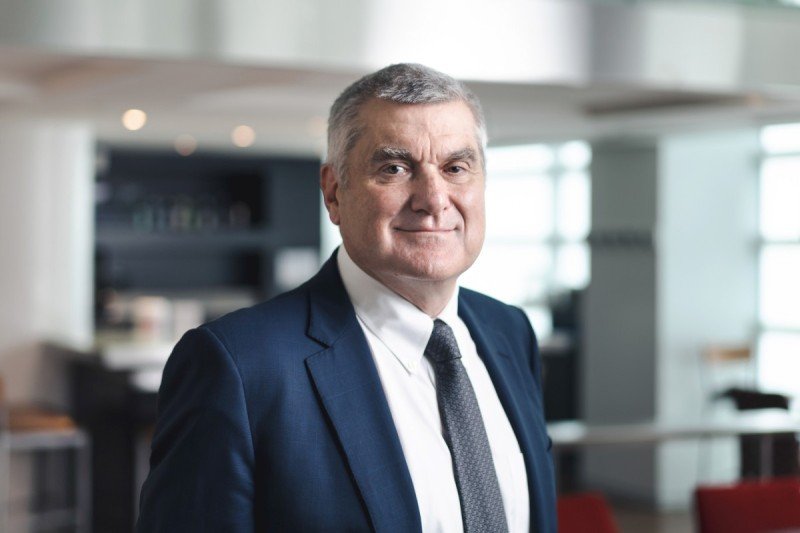
Craig B. Thompson led Memorial Sloan Kettering Cancer Center through an unprecedented period of transformation and growth.
At the time Dr. Thompson assumed the role of president and CEO in 2010, the field of immunotherapy, which began at MSK, was taking root. In 2011, the FDA approved the first immune checkpoint inhibitor (ipilimumab), ushering in the new era of immune-based cancer therapy.
More innovative breakthroughs followed with the development of a robust CAR T cell therapy program for the treatment of blood cancers in adults and children. MSK physician-scientists pioneered this type of “living drug,” administered just once to a patient, to harness their own immune cells to find and fight their cancer. Immunotherapy fundamentally changed how scientists and doctors think about cancer, and many patients in the earliest stage trials are still alive today.
But as meaningfully beneficial as immunotherapy has been for thousands of people with cancer, many patients still do not respond to these treatments, and tackling that challenge has been a major focus of basic and translational research at MSK under Dr. Thompson’s leadership. By developing synergistic combination treatments, identifying new immune cell targets, and better understanding the fundamental biology of immune cells, MSK scientists are steadily helping more patients to benefit from immunotherapy. One measure of the success of such efforts is that the 5-year survival rate of patients with metastatic melanoma has risen from less than 10% a decade ago to more than 65% today thanks to new combination immunotherapy treatments that MSK helped pioneer.
In 2013, Dr. Thompson championed the launch of the Center for Molecular Oncology (CMO), which paved the way for the field of precision medicine. Established with a gift of $100 million from the Marie-Josée and Henry R. Kravis Foundation, the CMO brought together researchers from many different areas of expertise to undertake a vast program to personalize treatment for patients based on their specific cancer mutations. It positioned MSK as an international leader in the study of cancer genomics and led to the development of MSK-IMPACT™, a next-generation targeted DNA-sequencing technology. The test detects gene mutations and other genetic changes in more than 500 genes linked to both rare and common cancers. Authorized by the FDA in 2017, MSK-IMPACT™ provides a comprehensive picture of the full spectrum of genetic changes in a tumor. To date, tens of thousands of patients have had their tumors sequenced to ensure they have the most effective treatments for their individual cancer.
Over Dr. Thompson’s tenure, MSK underwent unprecedented expansion. Today’s cancer care is primarily provided in the outpatient setting. Over the past decade, MSK has added 3 million square feet of outpatient care space, including 7 regional care locations across the greater New York and New Jersey area. The regional care network has enabled MSK to serve many more people with cancer, caring for them in their own communities and providing access to our world-class doctors, surgical expertise, and innovative clinical trials closer to their homes.
Dr. Thompson oversaw the planning, development, and opening of two major new MSK locations — beginning in 2015 with the Josie Robertson Surgery Center, a first-of-its-kind freestanding facility devoted entirely to outpatient cancer surgery. The patient-focused surgery center leverages technology and highly trained clinical teams to provide optimal care, making it easier for most patients to go home within a day of their surgery. The David H. Koch Center for Cancer Care at Memorial Sloan Kettering, a $1.5 billion state-of-the-art cancer treatment facility, opened in 2019, further expanding MSK’s pioneering outpatient capabilities. The 750,000-square-foot building is New York City’s largest freestanding cancer care facility. Its 25 floors house 231 exam rooms and 110 private infusion rooms, and it is home to more than 300 early phase clinical trials. The world-class David H. Koch Center for Cancer Care at MSK was specifically designed to study new therapies, unrivaled by any cancer treatment center in the area, and represents a new paradigm in technology-enhanced cancer treatment.
A champion of educating and training the next generation of leaders in science and medicine, Dr. Thompson awarded the first PhD degrees to graduates of the Louis V. Gerstner, Jr. Graduate School of Biomedical Sciences in 2012. He was also a popular speaker at MSK’s Major Trends in Cancer Research lecture series for high school and college students with an interest in the fields of science and/or biomedical research. The annual event is a community educational program designed to engage and inspire the next generation of progressive researchers and scientists.
But at his core, Dr. Thompson is a physician-scientist, having made significant contributions to the understanding and treatment of cancer. Earlier in his career, Dr. Thompson did highly acclaimed research on the genes that control programmed cell death and how the malfunction of such genes can contribute to cancer. He is also well known for making fundamental contributions to the understanding of the signals that control immune cell activation, findings that would help to pave the way for checkpoint blockade immunotherapy a decade later.
He maintains a research laboratory in the Cancer Biology and Genetics Program in the Sloan Kettering Institute, where his current area of focus is on the role that metabolic changes play in the origin and progression of cancer. By showing that the nutrients that a cell consumes can influence what genes are turned on in that cell, his lab has sparked renewed interest in the topic of cancer metabolism.
In September of 2022, Dr. Thompson stepped down as the President and Chief Executive Officer of Memorial Sloan Kettering Cancer Center. He was succeeded by Selwyn M. Vickers, MD.








